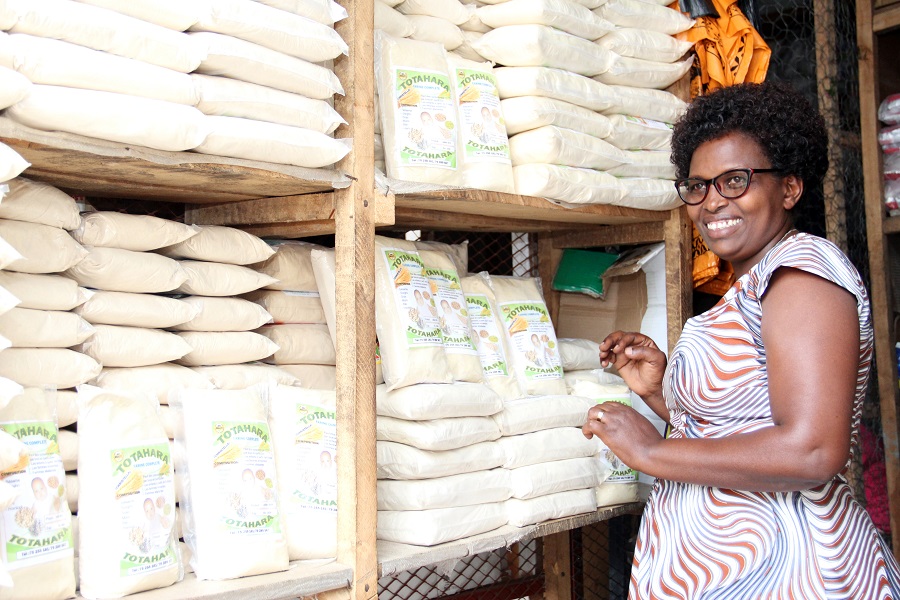
Common bean is a major food and cash crop for more than 90% of smallholder farmers in Burundi. Beans provide 20% of required calories and 50% of proteins, and are an entry point to tackle food insecurity, poverty and malnutrition.
The current average bean consumption is about 30 kg per person, per year.
However, Burundi also has high prevalence of malnutrition including micro-nutrient deficiencies – about 58% of children under five years are stunted, 56% are anemic, 35% are underweight and 7% are wasted. In addition, Zinc deficiency affects about 47% of the population.
Prompted by the need to address these constraints, the High Iron Beans Compact of Technologies for African Agricultural Transformation (TAAT) is set to address these micro-nutrient deficiencies in Burundi through scaling of three new High Iron Bean (HIB) varieties – MAC 44, RWV 1129 and MOORE88002.
The Alliance of Bioversity International and CIAT, working in partnership with the Institute of Agricultural Science of Burundi (ISABU), is promoting these three varieties alongside Good Agricultural Practices (GAPs), nutrition education and processed bean products.
Key channels for seed distribution include Confédération des Associations des Producteurs Agricoles pour le Développement (CAPAD), Catholic Relief Services (CRS), World Vision, Tworore Tuiguze Imbuto, Terimbere Murimunyi, and Appui au Développement Intégral et la Solidarité sur les Collines (ADISCO).
Sponsored by the African Development Bank as part of its Feed Africa Initiative, TAAT’s main objective is to improve the business of agriculture across Africa by raising agricultural productivity, mitigating risks and promoting diversification and processing in 18 agricultural value chains within eight priority intervention areas.
The programme increases agricultural productivity through the deployment of proven and high-performance agricultural technologies at scale along selected nine commodity compacts which include High Iron Bean.
These work with six enabler compacts addressing transversal issues such as soil fertility management, water management, capacity development, policy support, attracting African youth in agribusiness and fall armyworm response.
Led by Alliance of Bioversity International and CIAT, the TAAT High Iron Bean Compact’s interventions build on the Pan Africa Bean Research Alliance (PABRA) model and the “Bean Corridor” as a market-driven approach to transformation at scale
Within one year of implementation, the TAAT-HIB Compact had catalyzed production of over 300 MT of breeder and basic seed and more than 700 MT of certified seed reaching close to 40,000 farmers. The early maturing and higher yielding HIB varieties have seen bean productivity in the interventions rise to 1.8 tons/ ha against an average of 0.75 tons/ ha in the region.
The HIB Compact has also catalyzed private sector investments in the commercialization of HIB products that are healthy and easy to cook.
Totahara, one of the processors of HIB value-added products in Burundi started out in the backyard of Mme. Christella’s Ndayishimiye, using open firewood to roast beans and tarpaulins for drying. She has since expanded to open up a factory that is distributing up to 110 tons of bean flour per month throughout Burundi and neighbouring countries.
Totahara has scaled up production and now supplies to 40 retail outlets in Burundi and exports to countries such as D.R Congo and Rwanda. Totahara flour – a porridge flour that incorporates HIBs – has become popular among development partners that focus on child nutrition. The use of the flour in 22 schools resulted in reduction of stunting levels from 58% to 52%.
“Since I started the factory, I have employed 12 people on permanent contract and have 30 youth distributors. My supportive husband has also joined the team and works full-time in the business. From one shop, I am currently distributing the Totahara flour to 40 other shops and also work with the Ministry of Health and NGOs such as World Vision who work on nutrition. It is not easy being a successful businesswoman in a male dominated business field, but learning, consistency and commitment is my key to business success” says Christella, the owner of Totahara.
The TAAT HIB Compact envisages that through public-private partnerships, bean farmers (including women and youth) will have access to better quality seed and complementary productivity-enhancement technologies.
Synergies are being built with development partners for up-scaling these technologies in line with the Feed Africa imperatives










